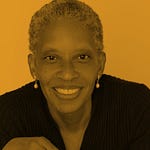…Mass shootings have been increasing at an exponential rate. Learn how to stuff a wound. Listen, I took family systems theory in seminary. I took genocide studies and took a hard, hard look at how the church was able to go from witnesses of Jesus Christ to bystanders to genocide. I read all the Gutierrez. I read all the liberation theology. I went to anything Dr. Cone would do. I would drive to go hear people in Princeton, including Cornell. I would go do that stuff and none of it mattered. No one cared.
That’s lenny duncan about what doesn’t work (and a little about what does) when fighting fascism.
This is the second in a three-part series on combating Christian nationalism, taken from my livestream on Wednesday. In this episode, we focus on what doesn’t work. Stay tuned for part three, dropping tomorrow, about what to focus on instead.
Our conversation about what doesn’t work centered around three main themes: shallow actions without the right motivations, attempting to reason or logic with people who aren’t ready for it, and trusting in institutions that weren’t designed to protect us.
This third point we actually get into in the third episode, because it became turning point for what we should do. (Spoiler: it’s about organizing and financially supporting organizations based in the communities they represent).
But these first two themes show up in different ways.
Shallow actions without the right motivations don’t work.
The wrong motivation is white guilt. Here’s Redeem:
We're seeing a lot of white people who are actually acting out of white guilt instead of really wanting to dismantle systems of oppression. What I'm finding is a lot of people, they're quick to say that I'm not racist, but they're kind of slow actually being anti racist, and there's a huge difference there.
White guilt leads to things like a social media account filled with liberal posts without following it up with action. Or voting without finding physical ways to protect your community after the election.
Redeem and I talked about this previously when I read him a quote from Lama Rod Owens’s book New Saints about when people do the right things for the wrong reasons:
We practice goodness not because we want to be seen as good or because we want to experience happiness or even because it is what we are supposed to be doing. We choose goodness because it’s how we get free while inviting others to join us.
Voting, educating ourselves, highlighting the voices of the most underrepresented folks, being at least liberal, recycling, carrying people’s groceries, reading the current justice books, never saying “Candyman” into a mirror, putting up Black Lives Matter signs, saying please and thank you, paying taxes, not wearing white shoes after Labor Day, supporting charities, avoiding cracks and walking under ladders, and offering thoughts and prayers are all wonderful things to do, but they are more about feeling good about ourselves and making sure others view us as favorably. Which one of these beloved labors will actually get us free?
Owens challenges his readers to change the motivations for their actions away from appearances or feeling good about yourself and deeply living a life that’s dedicated toward the freedom of all living things.
I think this starts with considering what it truly means to be antiracist, which is what lenny was saying in our conversation. They echo what they wrote in Dear Revolutionaries:
In other terms, you have to see it to believe it. You have to feel it. Know it in your bones. Training doesn’t do that. Workshops on racism in the church don’t do that. Books like this won’t do that. If white people read Black thinkers and it doesn’t lead them to live out a transformed political, economic, ancestral, and spiritual ethic, then grand words about liberation or deeper systemic understanding really just becomes dust on their tongue.
While lenny was speaking about the church, their points are just as valid for folks in academe or trying to make a difference in the for-profit sector. It’s all the same. Do your actions speak louder than your words?
Reasoning with people doesn’t work.
Shaming others for their actions or perspectives doesn’t work.
Here’s Blake:
One of the consequences of Trumpism is that he has essentially inoculated the people who are receptive to his message from general sort of shaming tactics. …He doesn't recognize or acknowledge any sort of moral hypocrisy because he doesn't really have morals. He acts from a place of pure ego and drive, And that has enabled people who are in a number of these spaces to act similarly. And so they may, ‘eat up liberal tears,’ so to speak. […] So in that respect, oftentimes if you're speaking in sort of an ecumenical or an interfaith type space, I don’t know whether it's valuable to say, ‘shame on you, this is not Christian. This is not a Christlike behavior.’ They're Christian because they say they're Christian. There are people who are Christian who do bad things.
And what about the people that do care about being Christlike? Friends, I have been trying to crack this for years. Any of us who come from an evangelical background know it’s like speaking a completely different language. Their values come from a particular way of reading the Bible based on circular logic. There’s no way to win those arguments.
And yet, like I said yesterday, sometimes when people are given time, they learn to see the faulty logic for themselves.
You can’t force an epiphany or even a sense of empathy onto people. But you can be there for them when they have an awakening for themselves. Part of this is just being prepared for hard conversations when people are ready to have them, which we’ll get into in the next episode.
Stay tuned tomorrow for part three: what does work in combating Christian nationalism/white supremacy/fascism in the US.














Share this post